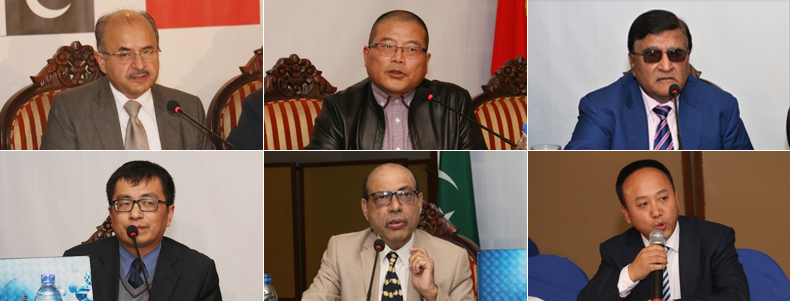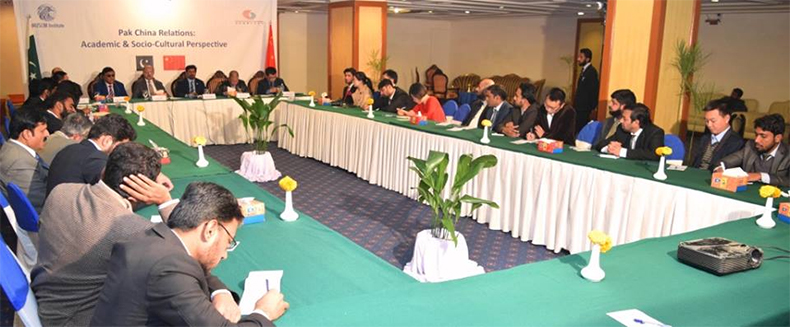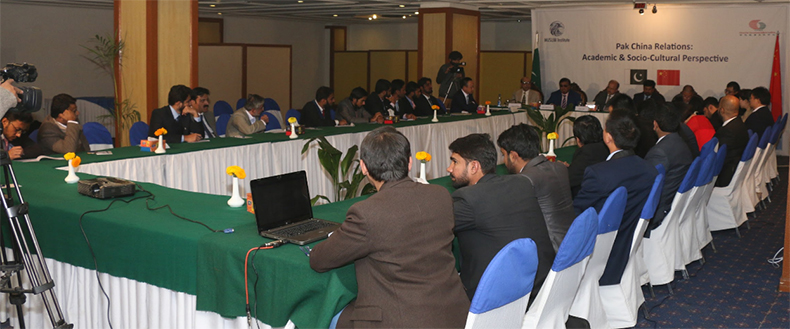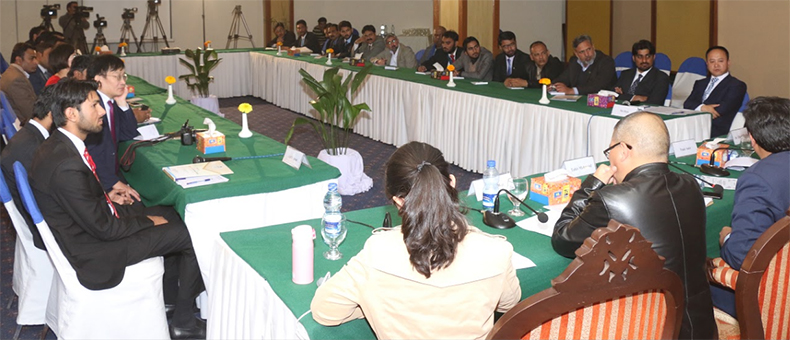|
MUSLIM Institute in collaboration with China Pakistan Educational and Cultural Institute organized a Round Table Discussion titled “Pak China Relations: Academic & Socio-Cultural Perspective” on December 8, 2017 at Islamabad. Air Vice Marshal (R) Faaiz Amir (Vice Chancellor, Air University, Islamabad) chaired the session. Mr. Tahir Mehmood (Public Relations Coordinator, MUSLIM Institute) delivered the opening remarks and moderated the proceedings. Other speakers include Mr. Zafar Bakhtawari (Former President, Islamabad Chamber of Commerce & Industry), Prof. Le Wei (Dean, School of International Education, Yunnan University, China), Dr. Zhang Daojian (Director, Confucius Institute, NUML Islamabad), Mr. Tanvir Jafri (Incharge, China Study Centre, COMSATS Institute of Information Technology, Islamabad) and Mr. Me Heju (CEO, China Pakistan Educational & Cultural Institute). Mr. Asif Tanveer Awan Advocate (Research Associate MUSLIM Institute) presented the vote of thanks. |
 Row 01 (From Left): Air Vice Marshal (R) Faaiz Amir, Prof. Le Wei, Mr. Zafar Bakhtawari |
|
Pak-China diplomatic relations were established in 1951. Pakistan is among those countries which recognized People's Republic of China soon after its revolution. Islamic republic of Pakistan is also the first Muslim state to establish relations with China. An unshakeable mutual trust between both the states was seeded soon after the Bandung Conference in 1955 under the efforts of the Premier Zhou Enlai. Pak-China friendship, described by the political leadership of both the states is as higher as mountains, as deeper as oceans and as sweeter as honey is a unique and exceptional case in the international system. |
 Hall view of round table discussion. |
|
China Pakistan Economic Corridor (CPEC) is going to be a reality and both countries have decided to establish an international economic hub. CPEC is a game changer because the fate of Pakistan as well as the region of South Asia and even the world at large is going to be changed. Current Chinese president, Mr Xi Jinping wants to make China an economic super power and in the pursuance of these initiatives, One Belt One Road (OBOR) project is in the process of completion. This initiative will connect 65 countries of the whole world. An interesting fact regarding this initiative is that out of a total 65 countries, 55 are Muslim countries. It looks that the world order is going to be reconstructed. The center of power is likely to be shifted from the West to the East. Pakistan is on the front line with China and CPEC will benefit both Pakistan and China economically. The One Belt One Road initiative would bring competition as well as stability between both the nations. It will not only improve infrastructure but also total export at large. The major task is based on five points. 1st is the policy communication, 2nd is the facility of connectivity, 3rd is regarding unlimited trade, 4th deals with mutual financing and the 5th considers strong people to people contact. If the two countries are devoid of indigenous connectivity, we will not be benefitting ourselves with the maximum potential enshrined in CPEC. They need to understand each other. They need to know their similarities as well as the differences so that they form the habit of respecting each other. In this respect, they will be able to explore their challenges mutually while influencing factors regarding their relationship in a positive manner. Most of the issues can be solved easily through academic, social and cultural exchanges and with also people to people contact between the two countries not only at state level but also at individual. The world is changing its dynamics and the China and Pakistan have specific and unique role in the world generally and in the region at large. Both the countries enjoy the peculiarity of their own cultural values and abilities to face the change, in this regard, a famous Chinese scholar says “Everyone respect one’s own culture and values. If we respect others’ culture and values, the world will be full of hope”. |
 Hall view of round table discussion. |
|
It will be better to enhance educational exchanges first which is the basic level. This level will disseminate a greater sense of opportunities regarding mutual understanding. Propagation of cultural affinity at student level deserves pivotal importance. In this respect, a high level of mutual confidence is required. It is really a good omen that Chinese students used to study in various universities of Pakistan. Both the governments are advised to invest heavily in the field of education while establishing world class educational institutions under mutual operational capacity. It will help a great deal in achieving mutual recognition regarding educational qualification between both the nations. Moreover, collaboration in significant areas like that of language and culture are of pivotal importance. Another significant area is the establishment of vocational education institutes across Pakistan in the wake of world’s largest credible project CPEC. Because a large number of skilled workers will be needed soon to drive the project up to its maximum potential. |
 Hall view of round table discussion. |
|
A large number of Buddhist antiques and sculptures are present in different museums of Pakistan including Taxila Museum, Lahore Museum, Peshawar Museum, Dir Museum and Karachi Museum which is a treasure encompassing wonders not only for the Chinese tourists but for the researchers belonging to the field of archaeology. These assets are not only promoting tourism in Pakistan but also providing a chance of interaction between the two peoples. |
Interactive Session: |
 Participants asking questions in interactive session |
|
A fruitful discussion took place in interactive session it is summarized as follows: |
Download pdf Newsletter Share
